AYO RECENT RESEARCH PROJECTS 2022
AYO Recent, Research Center conducted 5 research projects which were started in 2021. The projects were independent in-house research projects, wherein youth from across ASEAN and ASEAN+ nations participated not only as researchers but also as informants for our surveys and interviews. In 2021 we focused on the following key areas:
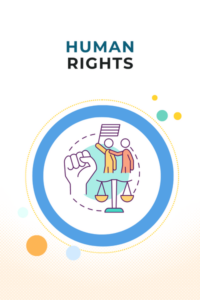


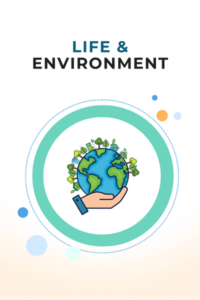

AYO RECENT IN 2021- 2022
Our research reports for 2021 cover myriad of issues which are of global eminence and we dissect them from an ASEAN and youth centric perspective. The projects started in October 2021 and finally concluded in May 2022. Our projects were conducted remotely by a network of 30 enthusiastic and dedicated young researchers from different countries and the projects successfully joined over 1500 youngsters with our cause. The research reports consolidate and represent the voice of the ASEAN youth. The title of our research reports are as follows:
- Relationship Between Socio-Economic Status and Attitude Towards LGBTQIA+ People in ASEAN.
- Remote Learning and Productivity Rates: The Experiences of University Students in ASEAN.
- What Does The Fall of Afghanistan Mean for International Relations? A Focus on The Mass Exodus of Refugees.
- Status Quo of Protection and Rights of Indigenous Communities: A Critical Review on Indonesia and Philippines.
- Data Protection in Contemporary ASEAN: Analyzing the Health Care Data Leaks in Indonesia.
RESEARCH REPORTS 2022
The full inclusion of gender minorities could improve economic outcomes for countries; however, Southeast Asian countries are slow to improve LGBTQ rights. Thus, the question of how LGBTQIA+ people in Southeast Asia are viewed and the determinants to influence their attitudes towards such minorities is crucial. This study aims to study the relationship between peoples’ socio-economic status and their attitudes towards LGBTQIA+ people in ASEAN. We surveyed about 436 adolescents and youths in ASEAN countries from October to December 2021. The online survey collected data on respondents’ demographic characteristics, socioeconomic status, and attitudes towards LGBTQIA+ people. Further, we used country-level socioeconomic development measures derived from secondary sources such as World Bank.
The multivariate regression analyses showed that micro-level variables such as youths’ age and gender are significantly related to attitudes towards LGBTQIA+ people in ASEAN countries. The more mature a youth is, a positive attitude he/she is likely to have towards such people. Similarly, females seem to have a positive attitude towards LGBTQIA+ people. The study of macro socioeconomic variables showed that the legal index, literacy rate, and women’s representation in the parliament are positively related while the country’s unemployment rate is negatively related to youths’ attitudes towards LGBTQIA+ people. This study suggests that policymakers in ASEAN countries should consider focusing and progressing on these macro socio-economic indicators to affect people’s attitudes towards LGBTQIA+ people positively.
Keywords: LGBTQIA+ people, Socio-economic status, Gender, Attitude, ASEAN.
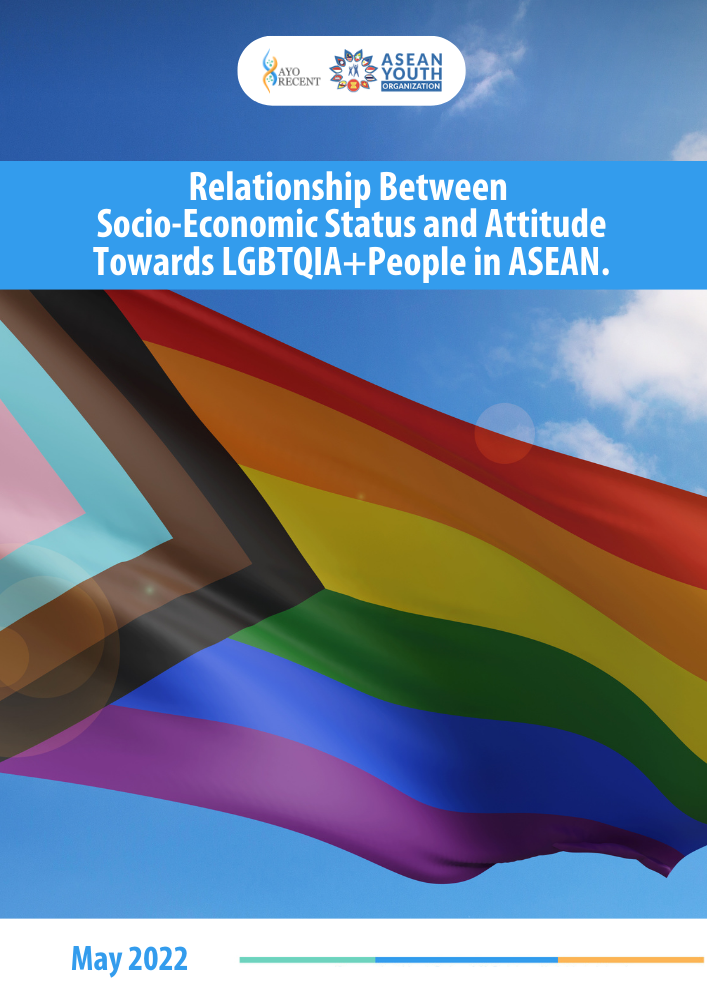
Remote Learning and Productivity Rates: The Experiences of University Students in ASEAN.
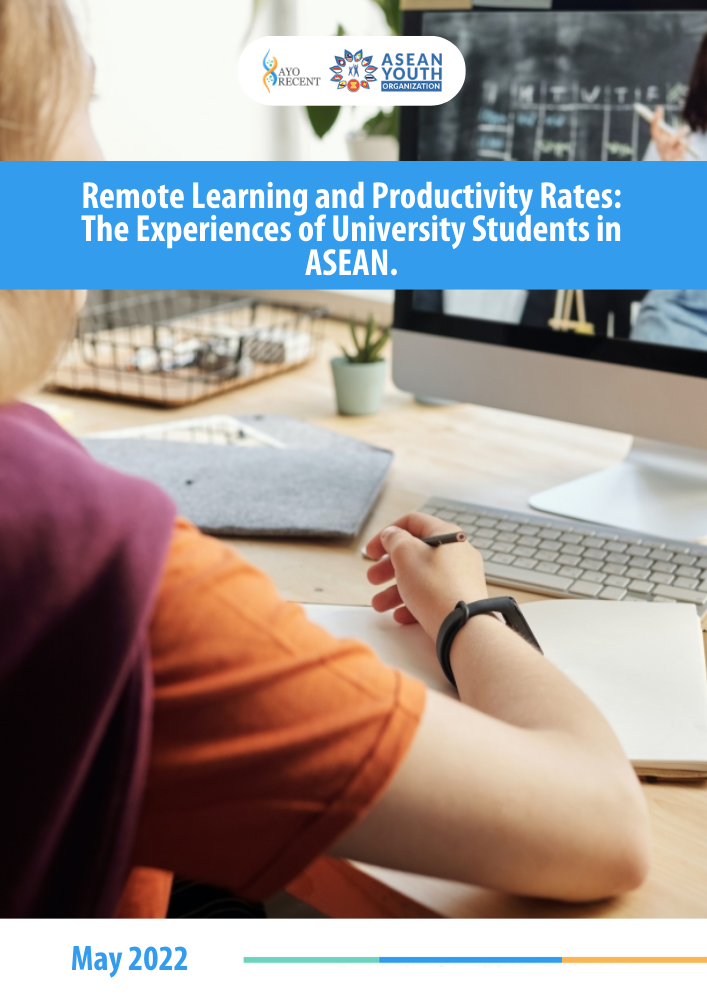
COVID-19 pandemic has changed how students around the world maintain and develop their productivity, especially due to the increased prevalence of remote learning. Students must shift their learning environment from in-person learning to remote learning due to the various lockdown situations as directed by each country’s regulations. Consequently, there would be pros and cons of transitioning to remote learning. Common challenges that university students in Southeast Asian countries face during online classes include technical concerns, lack of in-person interaction, distractions, time management, and other issues. Additionally, the most significant advantage of online learning over an offline one is the possibility to access limitless materials and meet individuals from all over the world. Although, there have been numerous studies on productivity and online learning in Western contexts, such as in the US.
Empirical data on the effect of online learning on quantifiable productivity measures across ASEAN is still lacking. Therefore, this research intends to analyze the impact of remote learning in encouraging their productivity and their motivation to pursue their aspirations. The survey is designated for university students from any ASEAN countries and will be analyzed using a quantitative descriptive analysis method. The data is collected from 204 participants across all ASEAN countries. By the end of this paper, this study provides policy recommendations to alleviate some negative impacts of remote learning and support ASEAN students in being more productive during remote learning.
Keywords: COVID-19, Productivity, Remote Learning, University Students.
What Does The Fall of Afghanistan Mean for International Relations? A Focus on The Mass Exodus of Refugees.
No sooner did the withdrawal of the United States and North Atlantic Treaty Organization (NATO) troops from Afghanistan complete than the race for international influence was underway. From neighboring nations to the Western World, Afghanistan’s deteriorating situation has demonstrated a fundamental realignment influenced by several factors. While some nations are floundering due to mass external displacement of refugees, the Taliban ascendancy also came with strategic concerns, particularly in terms of International Relations with the now, seemingly relevant, ‘Graveyard of Empires’. From a global perspective, understanding such geopolitical scenarios is a prime importance considering that several nuclear catastrophes in the past have stemmed due to a nation’s failure to conduct itself in a conflict involving two or more fronts. This paper explains the relationship between the recent outflow of Afghan refugees and the potential dynamics of international relations between a few key countries involved in the situation.
Our research intends to estimate the expected increase in refugee inflows in the next months, notably in neighboring countries, as well as to critically assess its influence on International Relations. On one end, our results incline towards likely tensions between USA, Russia & China, and on the other, also suggest favorable outcomes for Pakistan from the perspective of territorial occupation. In addition, selected statistics from the UN High Commissioner for Refugees (UNHCR) have been turned into graphical models in order to better grasp the severity of the situation. As a result, policymakers can benefit from the suggested research, which examines the status quo from a geopolitical viewpoint and establishes recovery strategies, where the status of refugees will surely play a key part.
Keywords: International Relations, Afghanistan, Refugees, ASEAN, Humanitarian crsis.
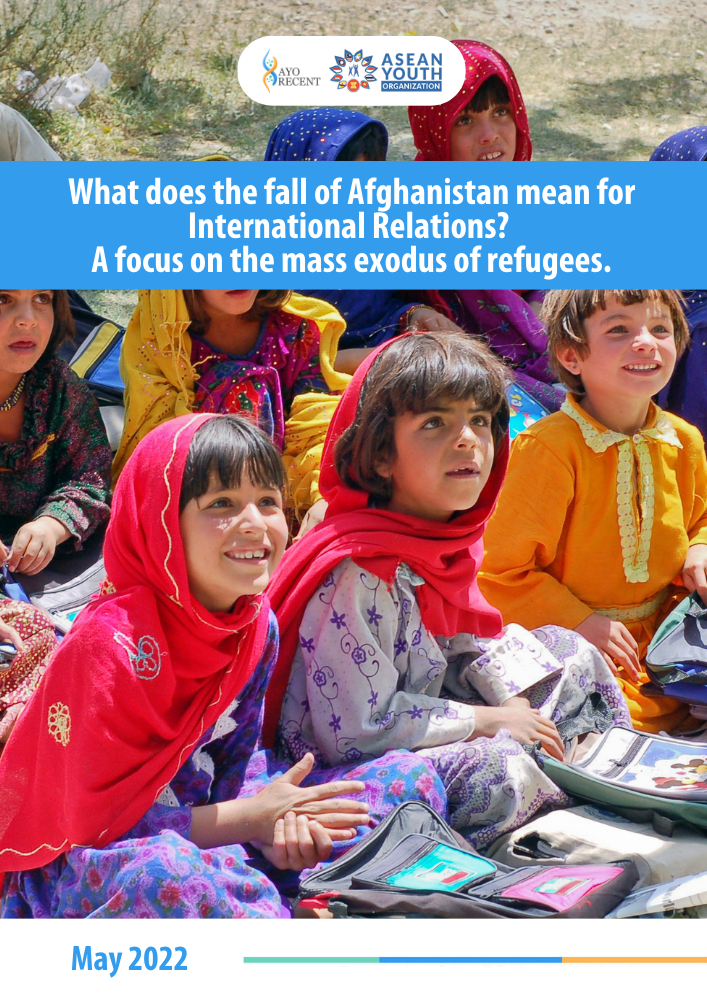
Status Quo of Protections and Rights of Indigenous Communities: A Critical Review of Indonesia and Philippines.
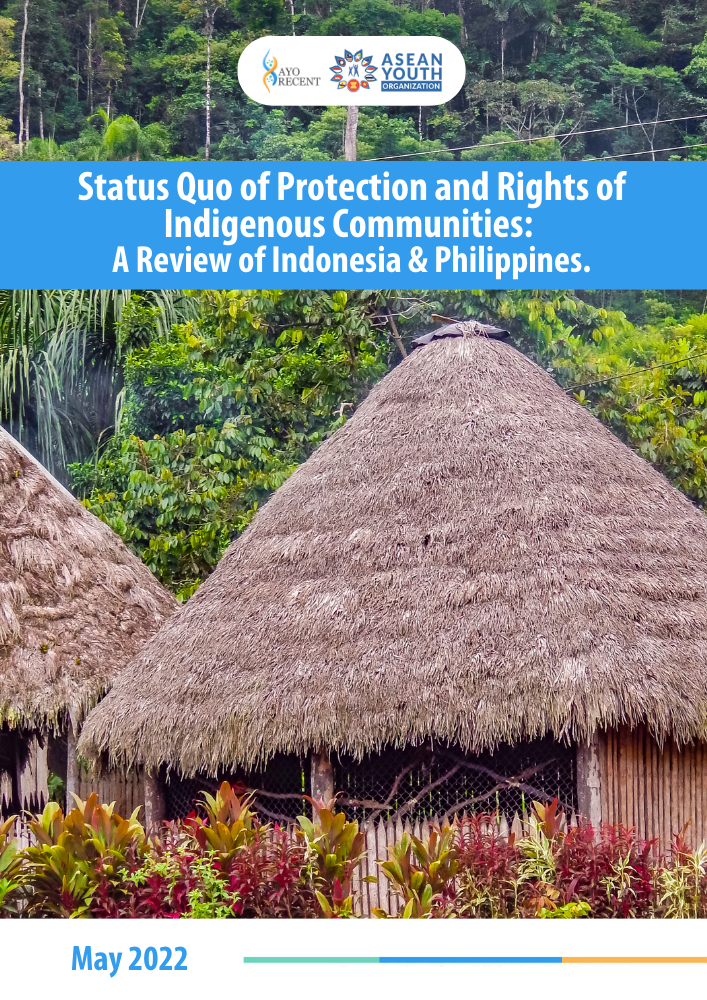
The struggle of Indigenous People (IP) rights on international perspectives had been discussed since a long time ago. Progress has been made since early 2000s, including the official UN Declaration of the Rights of Indigenous People (DRIP). The statement took on the guideline of Free, Prior, Informed Consent (FPIC), ensuring IP completely mindful and ready to control their territories, customs, and etc. However, this significant change did not occur in several countries of the Southeast Asia region. The IP rights as citizens of their respective countries are still obscured, even though the Domestic Laws mentioned them. It caused the direct involvement of IP in decision-making processes remains questionable.
This research aims to raise awareness of IP rights that are still inappropriately implemented. The method used is a qualitative method with literature and critical review approaches. This paper highlights the development of indigenous rights by comparing international laws and Southeast Asian domestic laws. The analysis aims to understand the relationship between IP law-making involvement and the protections of their existence in respective countries. This paper offers recommendations to the respective governments, local, and international organizations to improve the welfare of IP in Southeast Asia, especially in Indonesia and The Philippines.
Keywords: Indigenous People, Indigenous Rights, Domestic Laws, Decision Making, Indonesia, The Philippines.
Data Protection in Contemporary ASEAN: Analyzing the Health Care Data Leaks in Indonesia.
The cases of cyberattacks have been more prevalent since the rapid shift of daily activities into digital-based, especially amid the Covid-19 pandemic when the utilization of digital technologies is carried out in various countries to store the citizens’ health information data as an attempt to prevent further spread of the virus. However, some challenges appeared, such as the threat of data security since personal health information is considered more valuable in the market. The leakage and theft of personal health information from the citizens, including the Covid-19 test status, medical records, vaccination certificates, and other personal information, have threatened the security of the citizens.
ASEAN countries are especially vulnerable to cybersecurity which is proven by several personal data breach cases. Indonesia is one of the countries which has experienced the case of a personal healthcare data breach in the last two years of the pandemic, which has brought disadvantages for the citizens. The findings of recent research specifically share that the cause of data breaches in Indonesia is due to the lack of basic security measures of the data privacy protocols and weak cybersecurity infrastructure which make Indonesia healthcare information prone to be leaked by hackers. However, the discussion regarding the regulation and framework which could be the method for preventing such cases are yet to be discussed. Even though Indonesia has issued a commitment to personal data protection together with other ASEAN countries, the seriousness of the government to implement the proper regulation specifically for data protection remains questioned. Using secondary data from Indonesian healthcare data breaches, including two cases of BPJS and test-and-trace Covid-19 applications, this paper is trying to analyze the root causes of the accident and include the contribution of the existing laws and regulations in preventing such accidents from happening in the future.
Keywords: Health care, Data protection, Data leak, Indonesia, Cyber security.
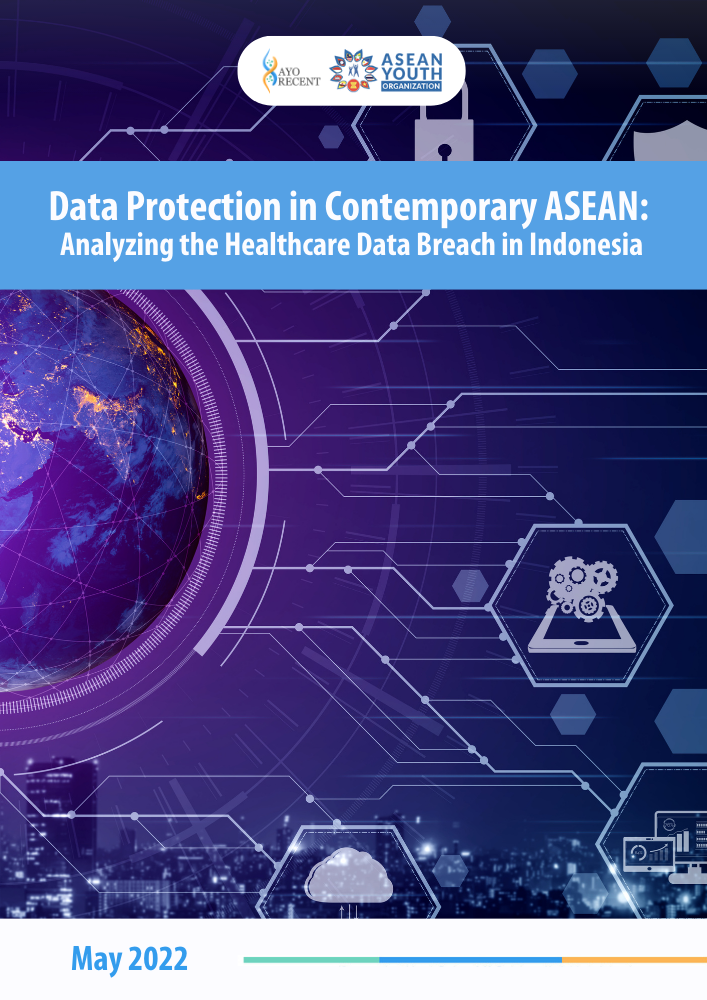
AYO RECENT RESEARCH PROJECTS 2022
AYO Recent, Research Center conducted 5 research projects which were started in 2021. The projects were independent in-house research projects, wherein youth from across ASEAN and ASEAN+ nations participated not only as researchers but also as informants for our surveys and interviews. In 2021 we focused on the following key areas:





AYO RECENT IN 2021- 2022
Our research reports for 2021 cover myriad of issues which are of global eminence and we dissect them from an ASEAN and youth centric perspective. The projects started in October 2021 and finally concluded in May 2022. Our projects were conducted remotely by a network of 30 enthusiastic and dedicated young researchers from different countries and the projects successfully joined over 1500 youngsters with our cause. The research reports consolidate and represent the voice of the ASEAN youth. The title of our research reports are as follows:
- Relationship Between Socio-Economic Status and Attitude Towards LGBTQIA+ People in ASEAN.
- Remote Learning and Productivity Rates: The Experiences of University Students in ASEAN.
- What Does The Fall of Afghanistan Mean for International Relations? A Focus on The Mass Exodus of Refugees.
- Status Quo of Protection and Rights of Indigenous Communities: A Critical Review on Indonesia and Philippines.
- Data Protection in Contemporary ASEAN: Analyzing the Health Care Data Leaks in Indonesia.
RESEARCH REPORTS 2022
Relationship Between Socio-Economic Status and Attitude Towards LGBTQIA+ People in ASEAN.
The full inclusion of gender minorities could improve economic outcomes for countries; however, Southeast Asian countries are slow to improve LGBTQ rights. Thus, the question of how LGBTQIA+ people in Southeast Asia are viewed and the determinants to influence their attitudes towards such minorities is crucial. This study aims to study the relationship between peoples’ socio-economic status and their attitudes towards LGBTQIA+ people in ASEAN. We surveyed about 436 adolescents and youths in ASEAN countries from October to December 2021. The online survey collected data on respondents’ demographic characteristics, socioeconomic status, and attitudes towards LGBTQIA+ people. Further, we used country-level socioeconomic development measures derived from secondary sources such as World Bank.
The multivariate regression analyses showed that micro-level variables such as youths’ age and gender are significantly related to attitudes towards LGBTQIA+ people in ASEAN countries. The more mature a youth is, a positive attitude he/she is likely to have towards such people. Similarly, females seem to have a positive attitude towards LGBTQIA+ people. The study of macro socioeconomic variables showed that the legal index, literacy rate, and women’s representation in the parliament are positively related while the country’s unemployment rate is negatively related to youths’ attitudes towards LGBTQIA+ people. This study suggests that policymakers in ASEAN countries should consider focusing and progressing on these macro socio-economic indicators to affect people’s attitudes towards LGBTQIA+ people positively.
Keywords: LGBTQIA+ people, Socio-economic status, Gender, Attitude, ASEAN.
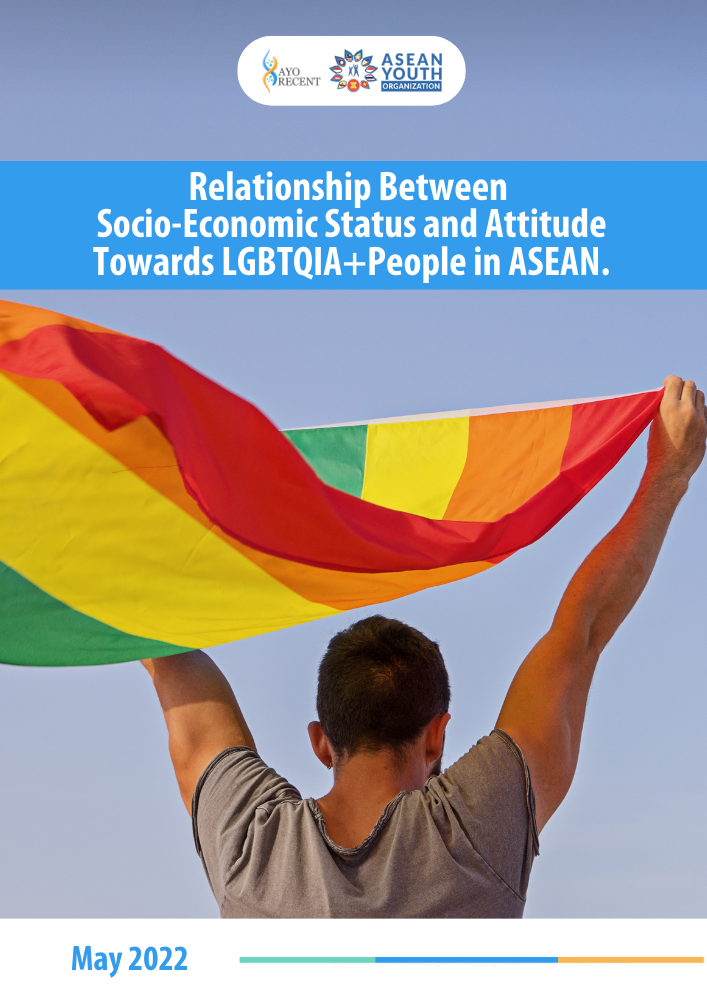

Remote Learning and Productivity Rates: The Experiences of University Students in ASEAN.
COVID-19 pandemic has changed how students around the world maintain and develop their productivity, especially due to the increased prevalence of remote learning. Students must shift their learning environment from in-person learning to remote learning due to the various lockdown situations as directed by each country’s regulations. Consequently, there would be pros and cons of transitioning to remote learning. Common challenges that university students in Southeast Asian countries face during online classes include technical concerns, lack of in-person interaction, distractions, time management, and other issues. Additionally, the most significant advantage of online learning over an offline one is the possibility to access limitless materials and meet individuals from all over the world. Although, there have been numerous studies on productivity and online learning in Western contexts, such as in the US.
Empirical data on the effect of online learning on quantifiable productivity measures across ASEAN is still lacking. Therefore, this research intends to analyze the impact of remote learning in encouraging their productivity and their motivation to pursue their aspirations. The survey is designated for university students from any ASEAN countries and will be analyzed using a quantitative descriptive analysis method. The data is collected from 204 participants across all ASEAN countries. By the end of this paper, this study provides policy recommendations to alleviate some negative impacts of remote learning and support ASEAN students in being more productive during remote learning.
Keywords: COVID-19, Productivity, Remote Learning, University Students.
What Does The Fall of Afghanistan Mean for International Relations? A Focus on The Mass Exodus of Refugees.
No sooner did the withdrawal of the United States and North Atlantic Treaty Organization (NATO) troops from Afghanistan complete than the race for international influence was underway. From neighboring nations to the Western World, Afghanistan’s deteriorating situation has demonstrated a fundamental realignment influenced by several factors. While some nations are floundering due to mass external displacement of refugees, the Taliban ascendancy also came with strategic concerns, particularly in terms of International Relations with the now, seemingly relevant, ‘Graveyard of Empires’. From a global perspective, understanding such geopolitical scenarios is a prime importance considering that several nuclear catastrophes in the past have stemmed due to a nation’s failure to conduct itself in a conflict involving two or more fronts. This paper explains the relationship between the recent outflow of Afghan refugees and the potential dynamics of international relations between a few key countries involved in the situation.
Our research intends to estimate the expected increase in refugee inflows in the next months, notably in neighboring countries, as well as to critically assess its influence on International Relations. On one end, our results incline towards likely tensions between USA, Russia & China, and on the other, also suggest favorable outcomes for Pakistan from the perspective of territorial occupation. In addition, selected statistics from the UN High Commissioner for Refugees (UNHCR) have been turned into graphical models in order to better grasp the severity of the situation. As a result, policymakers can benefit from the suggested research, which examines the status quo from a geopolitical viewpoint and establishes recovery strategies, where the status of refugees will surely play a key part.
Keywords: International Relations, Afghanistan, Refugees, ASEAN, Humanitarian crsis.


Status Quo of Protections and Rights of Indigenous Communities: A Critical Review of Indonesia and Philippines.
The struggle of Indigenous People (IP) rights on international perspectives had been discussed since a long time ago. Progress has been made since early 2000s, including the official UN Declaration of the Rights of Indigenous People (DRIP). The statement took on the guideline of Free, Prior, Informed Consent (FPIC), ensuring IP completely mindful and ready to control their territories, customs, and etc. However, this significant change did not occur in several countries of the Southeast Asia region. The IP rights as citizens of their respective countries are still obscured, even though the Domestic Laws mentioned them. It caused the direct involvement of IP in decision-making processes remains questionable.
This research aims to raise awareness of IP rights that are still inappropriately implemented. The method used is a qualitative method with literature and critical review approaches. This paper highlights the development of indigenous rights by comparing international laws and Southeast Asian domestic laws. The analysis aims to understand the relationship between IP law-making involvement and the protections of their existence in respective countries. This paper offers recommendations to the respective governments, local, and international organizations to improve the welfare of IP in Southeast Asia, especially in Indonesia and The Philippines.
Keywords: Indigenous People, Indigenous Rights, Domestic Laws, Decision Making, Indonesia, The Philippines.
Data Protection in Contemporary ASEAN: Analyzing the Health Care Data Leaks in Indonesia.
The cases of cyberattacks have been more prevalent since the rapid shift of daily activities into digital-based, especially amid the Covid-19 pandemic when the utilization of digital technologies is carried out in various countries to store the citizens’ health information data as an attempt to prevent further spread of the virus. However, some challenges appeared, such as the threat of data security since personal health information is considered more valuable in the market. The leakage and theft of personal health information from the citizens, including the Covid-19 test status, medical records, vaccination certificates, and other personal information, have threatened the security of the citizens.
ASEAN countries are especially vulnerable to cybersecurity which is proven by several personal data breach cases. Indonesia is one of the countries which has experienced the case of a personal healthcare data breach in the last two years of the pandemic, which has brought disadvantages for the citizens. The findings of recent research specifically share that the cause of data breaches in Indonesia is due to the lack of basic security measures of the data privacy protocols and weak cybersecurity infrastructure which make Indonesia healthcare information prone to be leaked by hackers. However, the discussion regarding the regulation and framework which could be the method for preventing such cases are yet to be discussed. Even though Indonesia has issued a commitment to personal data protection together with other ASEAN countries, the seriousness of the government to implement the proper regulation specifically for data protection remains questioned. Using secondary data from Indonesian healthcare data breaches, including two cases of BPJS and test-and-trace Covid-19 applications, this paper is trying to analyze the root causes of the accident and include the contribution of the existing laws and regulations in preventing such accidents from happening in the future.
Keywords: Health care, Data protection, Data leak, Indonesia, Cyber security.

AYO RECENT RESEARCH PROJECTS 2022
AYO Recent, Research Center conducted 5 research projects which were started in 2021. The projects were independent in-house research projects, wherein youth from across ASEAN and ASEAN+ nations participated not only as researchers but also as informants for our surveys and interviews. In 2021 we focused on the following key areas:





AYO RECENT IN 2021- 2022
Our research reports for 2021 cover myriad of issues which are of global eminence and we dissect them from an ASEAN and youth centric perspective. The projects started in October 2021 and finally concluded in May 2022. Our projects were conducted remotely by a network of 30 enthusiastic and dedicated young researchers from different countries and the projects successfully joined over 1500 youngsters with our cause. The research reports consolidate and represent the voice of the ASEAN youth. The title of our research reports are as follows:
- Relationship Between Socio-Economic Status and Attitude Towards LGBTQIA+ People in ASEAN.
- Remote Learning and Productivity Rates: The Experiences of University Students in ASEAN.
- What Does The Fall of Afghanistan Mean for International Relations? A Focus on The Mass Exodus of Refugees.
- Status Quo of Protection and Rights of Indigenous Communities: A Critical Review on Indonesia and Philippines.
- Data Protection in Contemporary ASEAN: Analyzing the Health Care Data Leaks in Indonesia.
RESEARCH REPORTS 2022

Relationship Between Socio-Economic Status and Attitude Towards LGBTQIA+ People in ASEAN.
The full inclusion of gender minorities could improve economic outcomes for countries; however, Southeast Asian countries are slow to improve LGBTQ rights. Thus, the question of how LGBTQIA+ people in Southeast Asia are viewed and the determinants to influence their attitudes towards such minorities is crucial. This study aims to study the relationship between peoples’ socio-economic status and their attitudes towards LGBTQIA+ people in ASEAN. We surveyed about 436 adolescents and youths in ASEAN countries from October to December 2021. The online survey collected data on respondents’ demographic characteristics, socioeconomic status, and attitudes towards LGBTQIA+ people. Further, we used country-level socioeconomic development measures derived from secondary sources such as World Bank.
The multivariate regression analyses showed that micro-level variables such as youths’ age and gender are significantly related to attitudes towards LGBTQIA+ people in ASEAN countries. The more mature a youth is, a positive attitude he/she is likely to have towards such people. Similarly, females seem to have a positive attitude towards LGBTQIA+ people. The study of macro socioeconomic variables showed that the legal index, literacy rate, and women’s representation in the parliament are positively related while the country’s unemployment rate is negatively related to youths’ attitudes towards LGBTQIA+ people. This study suggests that policymakers in ASEAN countries should consider focusing and progressing on these macro socio-economic indicators to affect people’s attitudes towards LGBTQIA+ people positively.
Keywords: LGBTQIA+ people, Socio-economic status, Gender, Attitude, ASEAN.

Remote Learning and Productivity Rates: The Experiences of University Students in ASEAN.
COVID-19 pandemic has changed how students around the world maintain and develop their productivity, especially due to the increased prevalence of remote learning. Students must shift their learning environment from in-person learning to remote learning due to the various lockdown situations as directed by each country’s regulations. Consequently, there would be pros and cons of transitioning to remote learning. Common challenges that university students in Southeast Asian countries face during online classes include technical concerns, lack of in-person interaction, distractions, time management, and other issues. Additionally, the most significant advantage of online learning over an offline one is the possibility to access limitless materials and meet individuals from all over the world. Although, there have been numerous studies on productivity and online learning in Western contexts, such as in the US.
Empirical data on the effect of online learning on quantifiable productivity measures across ASEAN is still lacking. Therefore, this research intends to analyze the impact of remote learning in encouraging their productivity and their motivation to pursue their aspirations. The survey is designated for university students from any ASEAN countries and will be analyzed using a quantitative descriptive analysis method. The data is collected from 204 participants across all ASEAN countries. By the end of this paper, this study provides policy recommendations to alleviate some negative impacts of remote learning and support ASEAN students in being more productive during remote learning.
Keywords: COVID-19, Productivity, Remote Learning, University Students.

What Does The Fall of Afghanistan Mean for International Relations? A Focus on The Mass Exodus of Refugees.
No sooner did the withdrawal of the United States and North Atlantic Treaty Organization (NATO) troops from Afghanistan complete than the race for international influence was underway. From neighboring nations to the Western World, Afghanistan’s deteriorating situation has demonstrated a fundamental realignment influenced by several factors. While some nations are floundering due to mass external displacement of refugees, the Taliban ascendancy also came with strategic concerns, particularly in terms of International Relations with the now, seemingly relevant, ‘Graveyard of Empires’. From a global perspective, understanding such geopolitical scenarios is a prime importance considering that several nuclear catastrophes in the past have stemmed due to a nation’s failure to conduct itself in a conflict involving two or more fronts. This paper explains the relationship between the recent outflow of Afghan refugees and the potential dynamics of international relations between a few key countries involved in the situation.
Our research intends to estimate the expected increase in refugee inflows in the next months, notably in neighboring countries, as well as to critically assess its influence on International Relations. On one end, our results incline towards likely tensions between USA, Russia & China, and on the other, also suggest favorable outcomes for Pakistan from the perspective of territorial occupation. In addition, selected statistics from the UN High Commissioner for Refugees (UNHCR) have been turned into graphical models in order to better grasp the severity of the situation. As a result, policymakers can benefit from the suggested research, which examines the status quo from a geopolitical viewpoint and establishes recovery strategies, where the status of refugees will surely play a key part.
Keywords: International Relations, Afghanistan, Refugees, ASEAN, Humanitarian crsis.

Status Quo of Protections and Rights of Indigenous Communities: A Critical Review of Indonesia and Philippines.
The struggle of Indigenous People (IP) rights on international perspectives had been discussed since a long time ago. Progress has been made since early 2000s, including the official UN Declaration of the Rights of Indigenous People (DRIP). The statement took on the guideline of Free, Prior, Informed Consent (FPIC), ensuring IP completely mindful and ready to control their territories, customs, and etc. However, this significant change did not occur in several countries of the Southeast Asia region. The IP rights as citizens of their respective countries are still obscured, even though the Domestic Laws mentioned them. It caused the direct involvement of IP in decision-making processes remains questionable.
This research aims to raise awareness of IP rights that are still inappropriately implemented. The method used is a qualitative method with literature and critical review approaches. This paper highlights the development of indigenous rights by comparing international laws and Southeast Asian domestic laws. The analysis aims to understand the relationship between IP law-making involvement and the protections of their existence in respective countries. This paper offers recommendations to the respective governments, local, and international organizations to improve the welfare of IP in Southeast Asia, especially in Indonesia and The Philippines.
Keywords: Indigenous People, Indigenous Rights, Domestic Laws, Decision Making, Indonesia, The Philippines.

Data Protection in Contemporary ASEAN: Analyzing the Health Care Data Leaks in Indonesia.
The cases of cyberattacks have been more prevalent since the rapid shift of daily activities into digital-based, especially amid the Covid-19 pandemic when the utilization of digital technologies is carried out in various countries to store the citizens’ health information data as an attempt to prevent further spread of the virus. However, some challenges appeared, such as the threat of data security since personal health information is considered more valuable in the market. The leakage and theft of personal health information from the citizens, including the Covid-19 test status, medical records, vaccination certificates, and other personal information, have threatened the security of the citizens.
ASEAN countries are especially vulnerable to cybersecurity which is proven by several personal data breach cases. Indonesia is one of the countries which has experienced the case of a personal healthcare data breach in the last two years of the pandemic, which has brought disadvantages for the citizens. The findings of recent research specifically share that the cause of data breaches in Indonesia is due to the lack of basic security measures of the data privacy protocols and weak cybersecurity infrastructure which make Indonesia healthcare information prone to be leaked by hackers. However, the discussion regarding the regulation and framework which could be the method for preventing such cases are yet to be discussed. Even though Indonesia has issued a commitment to personal data protection together with other ASEAN countries, the seriousness of the government to implement the proper regulation specifically for data protection remains questioned. Using secondary data from Indonesian healthcare data breaches, including two cases of BPJS and test-and-trace Covid-19 applications, this paper is trying to analyze the root causes of the accident and include the contribution of the existing laws and regulations in preventing such accidents from happening in the future.
Keywords: Health care, Data protection, Data leak, Indonesia, Cyber security.
